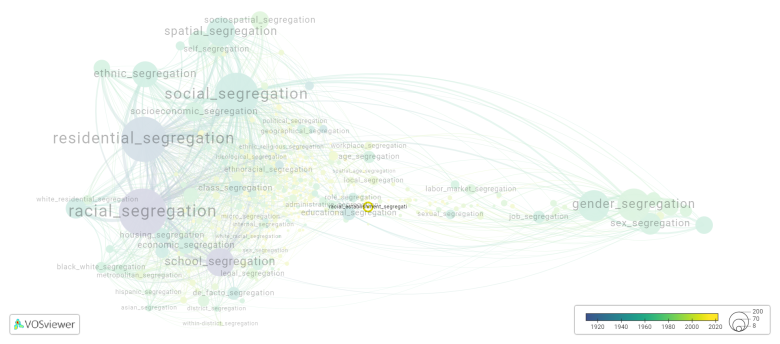Racial establishment segregation: Difference between revisions
(Creating page) |
(Creating page) |
||
| (One intermediate revision by the same user not shown) | |||
| Line 16: | Line 16: | ||
[[File:racial_establishment_segregation.png|780x780px]] | [[File:racial_establishment_segregation.png|780x780px]] | ||
This visualization is based on the study [[Segregation_Wiki:About| The Multidisciplinary Landscape of Segregation Research]]. | |||
For the complete network of | For the complete network of interrelated segregation forms, please refer to: | ||
* | * [https://tinyurl.com/2235lkhw First year of publication] | ||
* | * [https://tinyurl.com/2d8wg5n3 Louvain clusters] | ||
* | * [https://tinyurl.com/223udk5r Betweenness centrality] | ||
* | * [https://tinyurl.com/244d8unz Disciplines in which segregation forms first emerged (Scopus database).] | ||
==References== | ==References== | ||
==Notes== | ==Notes== | ||
Latest revision as of 07:17, 16 October 2024
Date and country of first publication[1][edit | edit source]
2018
United States
Definition[edit | edit source]
Racial establishment segregation, also known as racial segregation, is the separation of individuals or groups based on their race or ethnicity in various societal institutions, such as schools, housing, and public facilities. This form of discrimination has been historically practiced in many societies, particularly in the United States during the Jim Crow era, where laws enforced the separation of white and black individuals in various aspects of daily life.
Racial establishment segregation perpetuates inequality and marginalization of certain racial or ethnic groups, as it denies them equal access to resources, opportunities, and services. It also reinforces harmful stereotypes and prejudices, leading to social divisions and tensions within communities.
Efforts to combat racial establishment segregation include legislation, policies, and initiatives aimed at promoting diversity, equality, and inclusivity in all aspects of society. These efforts seek to dismantle systemic barriers and promote social justice for all individuals, regardless of their race or ethnicity.
See also[edit | edit source]
Related segregation forms[edit | edit source]
Racial establishment segregation is frequently discussed in the literature with the following segregation forms:
racial segregation, occupational segregation, employment segregation

This visualization is based on the study The Multidisciplinary Landscape of Segregation Research.
For the complete network of interrelated segregation forms, please refer to:
References[edit | edit source]
Notes[edit | edit source]
- ↑ Date and country of first publication as informed by the Scopus database (December 2023).
At its current state, this definition has been generated by a Large Language Model (LLM) so far without review by an independent researcher or a member of the curating team of segregation experts that keep the Segregation Wiki online. While we strive for accuracy, we cannot guarantee its reliability, completeness and timeliness. Please use this content with caution and verify information as needed. Also, feel free to improve on the definition as you see fit, including the use of references and other informational resources. We value your input in enhancing the quality and accuracy of the definitions of segregation forms collectively offered in the Segregation Wiki ©.
Racial establishment segregation appears in the following literature[edit | edit source]
Ferguson J.-P., Koning R. (2018). Firm Turnover and the Return of Racial Establishment Segregation. American Sociological Review, 83(3), 445-474. SAGE Publications Ltd.https://doi.org/10.1177/0003122418767438
